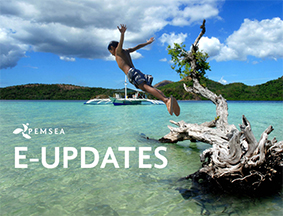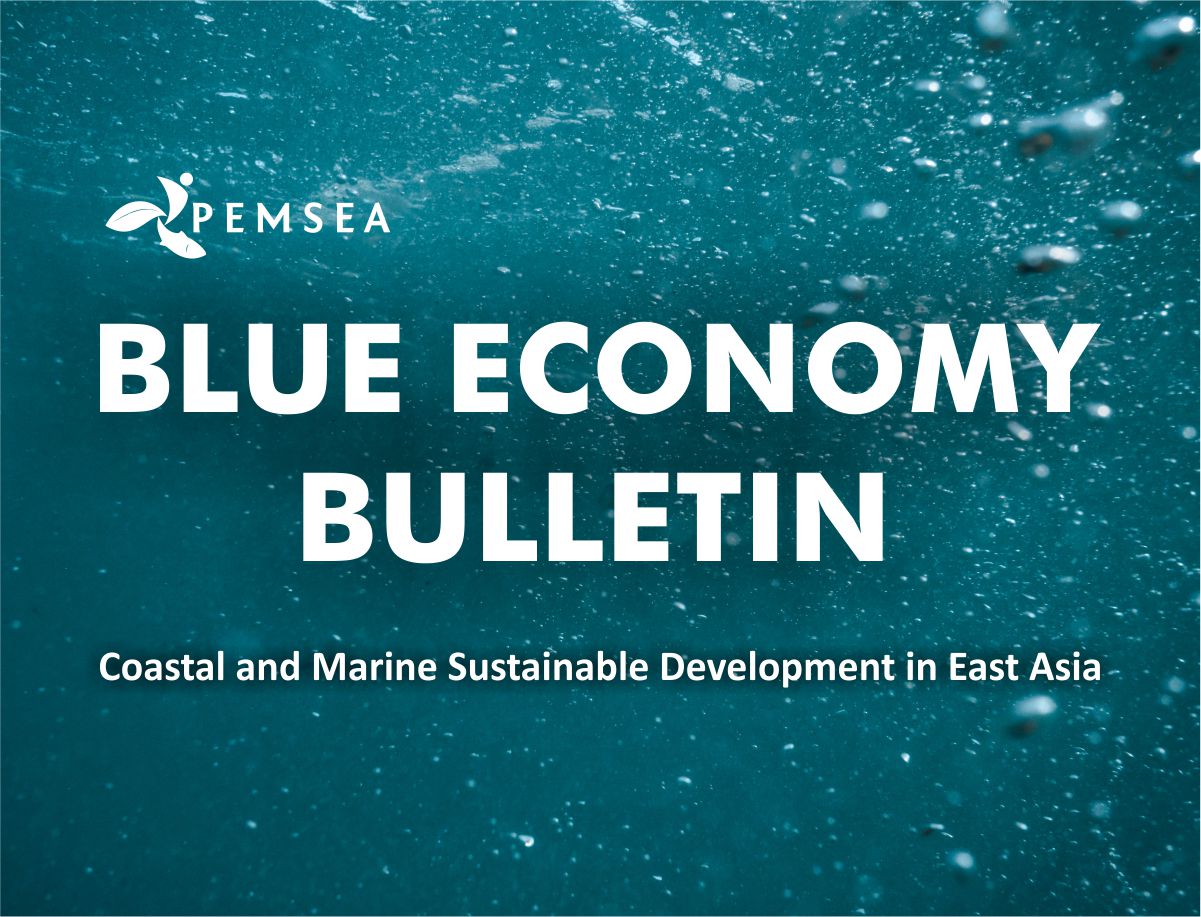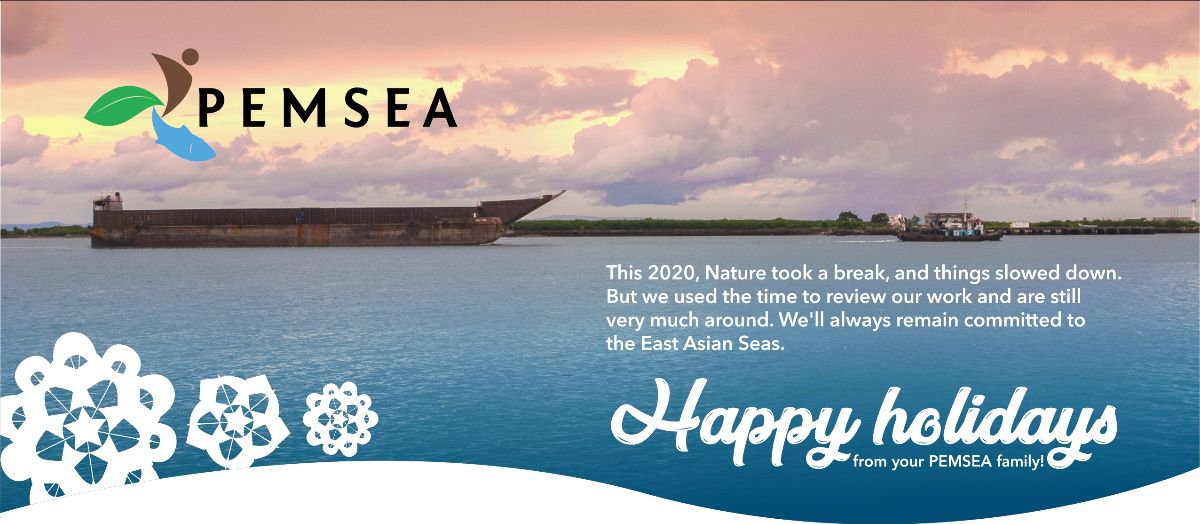
Breadcrumb
-
E-Update July 2021
Welcome to the July 2021 PEMSEA e-update. We encourage those eligible to join the EAS Futures Video Competition, with one month left to submit. Please also join us in an event on innovative approaches to evidence-based plastic pollution prevention, held on 5 August 2021.
Our recently concluded events include a kick-off meeting for the IMO-PEMSEA-IKI Blue Solutions Project to reduce the maritime transport emissions in Asia, as well as a live webinar focused on raising awareness of gender issues and mainstream social inclusion in the Arafura and Timor Seas (ATS) region. The significant role of PEMSEA in coordinating regional cooperation to adapt to sea level rise impacts was mentioned by Dr. Vu Thanh Ca in the United Nations Open-ended Informal Consultative Process on Oceans and the Law of the Sea meeting. In between newsletters, follow us on Facebook, LinkedIn and Twitter (@PEMSEA) for the latest updates.
-
Blue Economy Bulletin June 2021
Welcome to the PEMSEA Blue Economy Bulletin for June 2021. PEMSEA organized a number of online events this month, starting with an Ocean Roundtable Dialogue on World Ocean Day, with a focus on supporting collaborative actions to harness the blue economy in post-pandemic recovery plans. It was followed by a GESI conference organized by UNDP/GEF/ATSEA-2. Finally, we hosted two maritime transport related seminars with the IMO, the Regional Awareness Raising Seminar on the impact of biofouling on the marine environment in the seas of East Asia and a kickoff for an IMO/PEMSEA project supported by the International Climate Initiative (IKI) focused on tackling the global challenge of maritime transport emissions.
This month, we would also like to re-issue our call to all video enthusiasts to submit applications to the EAS Futures Video Competition. The deadline for submissions is on 1 September 2021.
A regional action plan was adopted by ASEAN member states and will be implementing over for the next five years to mitigate the plastic pollution issues. In Indonesia, a recycling centre was launched to reduce the plastic pollution by turning crisp bags and shampoo packets into paving bricks. Likewise, a Singapore recycling firm developed an application that assists in connecting the junk dealers with the company as well as members of the public who want recycling collected from outside their homes.
The Asian Development Bank (ADB) signed a green loan with wind power companies to build and operate three wind farms in Viet Nam, with an expectation of increasing the wind power capacity by 30%. Global Environment Facility (GEF) pledged to fund a Philippine government-led project to conserve Philippine Rise, while three new research projects on rising sea-level have been awarded with funding under National Sea Level Programme in Singapore.
Follow the latest updates on blue economy and coastal sustainable development in East Asia on Facebook, LinkedIn and Twitter (@PEMSEA). We welcome your feedback, and please let us know if there are other blue economy topics you would like to see in future newsletters and programs. -
E-Update May 2021
Welcome to the May 2021 PEMSEA e-update. In celebration of World Oceans Day, we are pleased to announce the Ocean Roundtable Dialogue (RTD) to promote blue economy during the new normal. This will take place on 8 June 2021. We hope you will be able to attend. We also look at how the SDS-SEA Project brought positive change through sustainable livelihood programs to eight Integrated Coastal Management (ICM) sites. Meanwhile, the ATSEA-2 Project has released its first Annual Project Progress Report, highlighting the work that has taken place at regional, national, and local levels. In between newsletters, follow us on Facebook, LinkedIn and Twitter (@PEMSEA) for the latest updates.
-
Blue Economy Bulletin April 2021
Welcome to the PEMSEA Blue Economy Bulletin for April 2021. This month, PEMSEA and partners held a virtual training workshop on claims and compensation for oil spills from ships. This training is part of PEMSEA's technical assistance to implement the Gulf of Thailand (GOT) Framework Programme and Strategic Action Plan 2017-2021. Check out information on the upcoming East Asian Seas (EAS) Congress 2021. The Congress proper, which will be held in December, will be preceded by a series of online events starting from June 2021. For more information, please visit the EAS Congress 2021 website. PEMSEA has announced the winners of the EAS Futures Youth and the Oceans Photo Competition and the deadline of the EAS Futures Youth Video Competition has been extended to 1 September 2021.
In coastal and marine news through East Asia and elsewhere, a new report found that Southeast Asian countries could potentially unlock significant value through better recycling of plastic waste. Viet Nam committed to tackling plastic pollution through its announcement as co-convenor of a Ministerial Conference on Marine Litter and Plastic Pollution. Likewise, UNEP and Google announced to fight plastic pollution together by applying citizen science and machine learning.
A webinar series on Conservation Financing emphasized the importance of sustainable management on biodiversity and discussed the potential efforts to augment revenue and diversify funding sources to finance conservation. Through puppetry and stories, an Indonesian environmentalist draws national attention to the importance of mangrove conservation. A study by the World Economic Forum suggests freshwater fish farms are potentially a more sustainable alternative to farming at sea, bolstering food security with fewer economic and resource constraints.
Follow the latest updates on blue economy and coastal sustainable development in East Asia on Facebook and Twitter (@PEMSEA). We welcome your feedback, and please let us know if there are other blue economy topics you would like to see in future newsletters and programs.
-
E-Update March 2021
Welcome to our second e-update of 2021. This month we have stories from the ASEANO Project, State of Oceans and Coast reporting, and the PNLG. Also this month, the World Bank has released plastic market studies from Malaysia, the Philippines, and Thailand. In between newsletters, follow us on Facebook and Twitter (@PEMSEA) for the latest updates.
-
Blue Economy Bulletin February 2021
Welcome to the first Blue Economy Bulletin of 2021. 2020 was a difficult year, and holds many lessons for project management. We look at the effects of the pandemic on our SDS-SEA implementation throughout the region. We also share a timeline of the 28 years of PEMSEA activities, leading up to this year's East Asian Seas Congress.
The importance of fisheries for human and ecological health has been reinforced by a recent report into the state of freshwater fish populations. Meanwhile the FAO has committed to developing transshipment guidelines. A province in Viet Nam is looking to expand shrimp aquaculture in light of changing environmental conditions. Plastic pollution remains a significant blue economy challenge, especially due to its link to climate change. The concept of plastic credits has emerged, reflecting such a link, although it remains ill-defined. In the Philippines, plastic straws are among the materials being considered for banning.
Follow the latest updates on blue economy and coastal sustainable development in East Asia on Facebook and Twitter (@PEMSEA). We welcome your feedback, and please let us know if there are other blue economy topics you would like to see in future newsletters and programs.
-
E-Update January 2021
Welcome to the first PEMSEA e-update of 2021! The EAS Youth Photo and Video Competition, launched towards the end of 2020, is still ongoing. We encourage you to share information about this competition with others, and participate if you are eligible. To start off 2021, we have released a series of National State of Oceans and Coasts reports, which provide a holistic view of the marine resources and coastal status of PEMSEA Country Partners, and case studies of their transition towards a sustainable and inclusive blue economy. We also report on a PEMSEA Network of Local Governments (PNLG) forum which included representatives from 35 LGUs from throughout the seas of East Asia, who discussed sustainable development and the blue economy, and on a new agreement between PEMSEA and OSRL. Below that are selected news stories covering what's happening in the coasts and oceans of the region. In between newsletters, follow us on Facebook and Twitter (@PEMSEA) for the latest updates.
-
PEMSEA 2020
Our best moments in a year that challenged the East Asian Seas region and the world.
-
E-Update November 2020
Welcome to the November 2020 e-update. We are pleased to announce the EAS Futures: Youth and the Oceans Competition, to engage the youth up to age 30 in the crucial coastal and ocean management issues that face us. As the year draws to an end, so does the UNDP/GEF Scaling Up Implementation of the SDS-SEA project. We report on its conclusion in Thailand. Meanwhile, the Philippine province of Guimaras has released a new Coastal Strategy, developed through coordination and partnership with many local stakeholders. PEMSEA also participated in many webinars and online events hosted by partners and collaborators such as the Xiamen World Ocean Week (XWOW 2020) , UNEP Sea of Solutions 2020, and the International Ocean Institute (IOI) conference on Covid 19 and Blue Economy. In between newsletters, follow us on Facebook, LinkedIn, Twitter for the latest updates.


